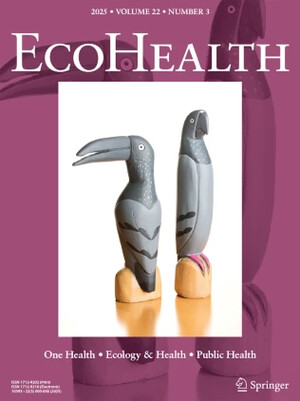
Evidence for ADP-ribosylation and G protein in Theileria parva-transformed bovine lymphocytes
Abstract
East coast fever (ECF) is a major tick-borne disease caused by the apicomplexan parasite Theileria parva (1). ECF is an acute leukemia-like disease of cattle that is endemic in eastern, central and souther Africa, where it is responsible for significant mortality and losses in animal production. The invasion and transformation of cells by T. parva sporoxoites has been well documented (2-4). This mammalian-infective stage of T. parva is injected into the host during feeding by the tick Rhipicephalus appendiculatus. The sporozoites invade lymphocytes by engaging a ligand receptor like process that may involve MHC class 1 molecules (4). At the same time the parasites surface coat is shed into the interstitum. After internalization, the sporozoites rapidly escape the host cell plasma membrane surrounding the parasites. In this manner, a parasitophorous vacuole is not formed and so the parasites enter freely into the cytoplasm of the infected cell where they differentiate into schizonts, the lymphocytic stage of Theileria. The Theileria schizont, is unique among protozoan parasites becuase it induces lymphocytes to undergo transformation and clonal expansion. These Theileria-infected lymphocytes are considered neoplastic because they acquire alterations in surface phenotype they are pleiomorphic they divide rapidly and they invade tissues when injected into athymic mice or SCID mice (5-6). Recently it was demonstrated that T. parva (muguga)-infected T cells have enhanced tyrosine kinase (5) and casein kinase II activities which may play roles in the transformation of these cells (7.8). Casein kinase II (CKII) is known to be an important element in many regulatory pathwasy of the cell, including signal transduction cascades and in cell cycle regulation. Its activity is markedly elevated in T. parva-infected lymphocytes (7.8). For a variety of reasons including the unexpected observation that the catalytic subunit of T. parva CKII(x) contains a putative signal peptide, it was proposed that dysregulation of this enzyme may predispose cells to oncogenic transformation. Subsequent studies using transgenic mice in which the CKIIx subunit of the enzyme was put under the control of a globulin promoter, showed that CKIIx can indeed function as an oncogene (6). Under the control of the adventitious promoter alone, CKIIx dysregulation resulted in the development of lymphoma in up to 16 percent of the transgenic mice. However, close to 100 percent of the animals developed perinatal leukemia and died in bi-transfectant mice bearing the CKIIx with myc, a nuclear oncogene whose dysregulation is associated with lymphoid neoplasms. In this report we describe the search for potential upstream signaling events that may modulate CKII or tyrosine kinase in T. parva-transformed T. cells.
Citation
Molecular and Biochemical Parasitology;92: 181-186









